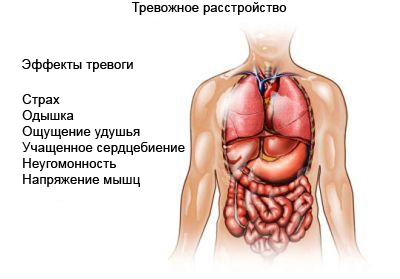Generalized Anxiety Disorder
Description of generalized anxiety disorder
Generalized anxiety disorder (GTR) caused by chronic, exaggerated fears and anxiety about everyday life. People with GAD never cannot relax and usually expect the worst. Strong anxiety interferes with normal life at school, at work, and in personal relationships. Anxiety is often not associated with anything.
People with GAD often worry excessively about health, family, the work of the, or money. Their fears are so strong, that prevent to live a full life. Anxiety may also progress to the State, When people “worry about what they worry”. GAD usually begins in childhood or adolescence, but he also can start at a young age, after 20 years.

Causes of generalized anxiety disorder
The exact cause of GAD is unknown. Researchers believe, that it is caused by a combination of genetic, environmental, and psychological factors.
Risk factors
Factors, increase the likelihood of generalized anxiety disorder:
- Paul: female;
- The presence of family members with anxiety disorder;
- Long stay under the influence of violence, poverty and other negative factors;
- Low self-esteem;
- Tobacco or other harmful substances abuse;
- Exposure to stress.
Symptoms of generalized anxiety disorder
GAD symptoms usually occur gradually. People with GAD often have psychological and physical symptoms of anxiety.
Psychological symptoms include:
- Excessive concern about current affairs and tensions;
- Irritability;
- Difficulty concentrating;
- Stress.
Physical symptoms:
- Fatigue
- Muscle tension;
- Headache;
- Tremor;
- Difficulty sleeping;
- Breathlessness;
- Sweating;
- Cardiopalmus;
- Feeling of choking;
- Abdominal pain;
- Diarrhea;
- Nausea.
People with GAD often have other anxiety disorders, prone to depression, and/or problems with alcohol or drug.
Diagnosis of generalized anxiety disorder
The doctor asks about the symptoms and medical history, produces physical examination. There will also be a search for other diseases, which may be the cause of the symptoms (eg, overactive thyroid).
You need to tell the doctor about medications taken. Some medications can cause side effects, similar to the symptoms of GAD. The doctor may also ask about taken active substances. They may include nicotine, caffeine, drugs, prescription drugs and alcohol.
To diagnose GAD, symptoms should:
- Continue for most of the time;
- Interfere in daily life (eg, forced to miss work or school).
- Duration from the beginning signs of not less than six months;
Treatment of generalized anxiety disorder
If there is a light form of GAD is applied therapy, that teaches, How to get rid of anxious thoughts. The therapy includes:
Cognitive therapy povedencheskaya
Work therapist aims, to change the mindset of the patient, that allows you to respond to situations more calmly, the alarming. This can reduce the symptoms of anxiety.
Povedencheskaya therapy
The therapist teaches the patient relaxation technique, including glubokmu breathing, muscle relaxation and visualization. Learning how to rasslablenijaja can help the patient gain control over anxiety. Instead of, to react with anxiety and tension, the patient learn to remain calm. The doctor may also expose the patient small effects, that causes anxiety and tension. This will allow it to conduct therapy and directly observe the patient in unfavourable for Wednesday.
Support Groups
Joining a self-help or support groups is often quite useful. This form of support enables you to share your experiences and learn, how others coped with GAD.
Biofeedback
Biofeedback works by attaching sensors to the body. The therapist tries to grasp the signals of the body, of stimuli, and determine the treatment, to reduce anxiety.
Medication
Medications can be prescribed for symptoms, that are severe and interfere with work. Medications can help relieve symptoms. It is important to note, that many medicines cannot be abruptly terminate, their removal should be gradual. You should consult your doctor before you stop taking any medicine.
Medicines may include:
- Benzodiazepines – to relax the body and combat stress in response to the disturbing thoughts. These medications must be taken under control, because they can cause addiction;
- Drugs to reduce anxiety:
- Buspirone – sedative, that is not addictive;
- Alprazolam – can be assigned for a short period of time;
- Antidepressants (most often, serotonin reuptake inhibitors [SSRI'S]) – to control the anxious thoughts. Some Antidepressants can cause deterioration in mood and behavior changes, including suicidal thoughts in some patients (rarely);
- Beta blockers can be used, to reduce the physical symptoms of anxiety.
Prevention of generalized anxiety disorder
At the moment, methods for the prevention of generalized anxiety disorder are unknown. Early detection and treatment can reduce the risk of severe psychological complications. Some data indicate, that physical exercises can reduce the symptoms of generalized alarming disorder. To further reduce the symptoms of anxiety, caffeine must be avoided, Nicotine, and excessive consumption of drugs for colds (ARI).
